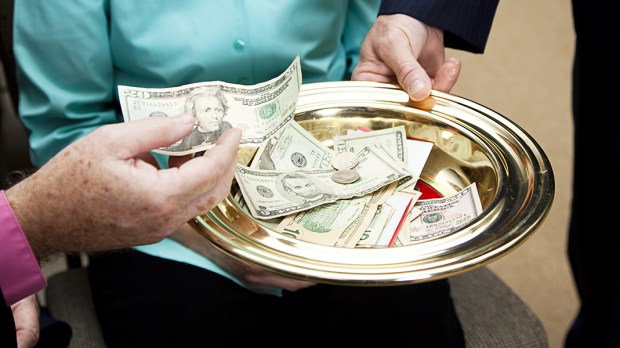If I offered to teach you how to oblige God to owe you money, would you be interested?
You might object: “Oh, Father! That’s impossible! If you try to oblige God to do anything on your behalf—that’s magic, not faith; that’s presumption, not hope.”
And you’d be right, of course.
But that doesn’t stop some fundraisers for “the business of Churchianity” from saying something like this: “No one can outdo God in generosity!” (The response of an intelligent child would be, “Duh! Of course not!”) The implication in the rest of the pitch runs like this: “If you give x-amount of money to our ministry/apostolate/parish/worthy cause, you’ve obliged God to give back to you even more—because no one can outdo God in generosity!”
It’s all a manipulative scam, of course. Sadly, in a materialist, consumerist, narcissistic culture, even the penitential season of Lent can be repackaged as a season of self-promotion. (I wrote about that at the start of Lent HERE.) The three traditional practices of Lent — prayer, fasting and almsgiving — can all be subverted. I’ve already written this Lent about prayer (HERE) and fasting (HERE). This week, let’s talk about almsgiving.
“Alms” comes from the Greek word, “eleēmosýnē,” meaning pity, compassion or mercy. It’s any act of material benefit given to those in need. Traditionally, Lenten alms are given over and above one’s usual charitable donations. The saints praised almsgiving, regardless of one’s place on the financial ladder. One has to make use of the virtue of prudence when distributing alms, so that what is donated does not cause harm to the recipient. As early as the Apostolic Constitutions, Christians are warned: “Alms must not be given to the malicious, the intemperate, or the lazy; lest a premium should be set on vice” (Const. Apost., ii, 1-63; iii, 4-6).
Note how there’s no reference to obligating God to provide a return on what’s a donation and not an investment. No reference to self-benefit. So … what’s the “pay-off” for almsgiving ? That’s the wrong question, isn’t it? It’s like asking, “What’s the pay-off for love?”
St. Leo the Great tells us:
There is no more profitable practice as a companion to holy and spiritual fasting than that of almsgiving … The person who shows love and compassion to those in any kind of affliction is blessed, not only with the virtue of good will, but also with the gift of peace … in the matter of almsgiving not only the rich and affluent but also those of average means and the poor are able to play their part. Those who are unequal in their capacity to give can be equal in the love within their hearts.

Read more:
Why giving to the poor is NOT actually charity
Generosity, motivated by love, motivated by gratitude from a loved sinner who by God’s grace can imitate (and not obligate) God’s compassion—that’s the source of almsgiving as a Lenten practice. We who live in a fallen world are prone to selfishness. Almsgiving, as an act of Christian charity, works as a purge against selfishness. Almsgiving without conversion is useless, as St. John of Kronstadt warns us:
Almsgiving is good and salutary when to it is united the amendment of the heart from pride, malice, envy, slothfulness, indolence, gluttony, fornication, falsehood, deceitfulness, and other sins. But if the man is not careful to amend his heart, trusting only to his alms, then he will obtain but little benefit from them, for he builds with one hand and destroys with the other.
There are very many worthy causes for a Christian to support with alms during Lent. There are also a lot of scams out there too. People who have been blessed with resources have an obligation to be good stewards of what’s been entrusted to them, and must exercise due diligence, so as not to donate to a fraudulent cause. It should also be said that we have resources that can’t be shared by means of cash, check, or credit card. We have resources of heart, hospitality, and hands. Are we alert to how we can give of ourselves to those in need? Are we willing to inconvenience ourselves in the service of others?

Read more:
How the future Pope Francis began thinking of the poor — by kissing bread
Remember that after the Angel Gabriel left the Virgin Mother Mary, Mary went immediately to visit her pregnant cousin, Elizabeth. She didn’t send a check to Elizabeth’s Baby Registry on Amazon—no, she traveled to spend time with her cousin when travelling was difficult, exhausting, even dangerous. In response to God’s generous initiative, Our Lady imitated God and gave of herself.
I think that is a good example that is hard to improve on for Lent. What will you do today to prove to God that you are grateful for your blessings?
When I write next, I will continue our series of Lenten reflections. Until then, let’s keep each other in prayer.

Read more:
A pick-me-up from Cardinal Newman to keep up your Lent
Read more:
Investing the Catholic way

